SHS Principal Ken Bonamo Offers Thoughts on AI in Education at 2025 Graduation
- Monday, 23 June 2025 10:35
- Last Updated: Monday, 23 June 2025 11:36
- Published: Monday, 23 June 2025 10:35
- Joanne Wallenstein
- Hits: 1647
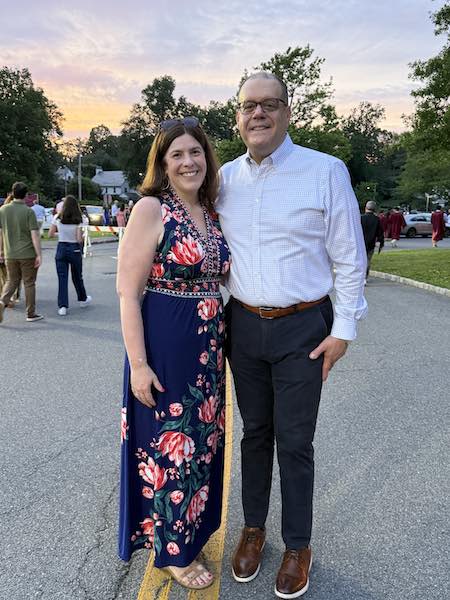 Andrea O'Gorman and Ken BonamoHere are remarks delivered by Scarsdale High School Principal Kenneth Bonamo at the graduation of the Class of 2025 on June 20, 2025.
Andrea O'Gorman and Ken BonamoHere are remarks delivered by Scarsdale High School Principal Kenneth Bonamo at the graduation of the Class of 2025 on June 20, 2025.
Good evening President Hahn, Superintendent Patrick, fellow members of the faculty, parents and friends, and most especially the members of the Class of 2025.
Today is a special day that marks the culmination of your childhood education and the beginning of college and adulthood for you.
Your families and your teachers are filled with a deep hope that we have given you all that you need to succeed in these next stages, and we are filled with anticipation at what the future holds for you.
The resources that the Scarsdale community devotes to education have allowed us to provide you with an enriching and engaging experience that has developed in you a depth of critical and creative thinking, an appreciation for global interdependence, and a genuine love of learning.
These goals have guided our work as a faculty in designing the courses and learning activities that you’ve enjoyed during the past four years. The vantage point of graduation allows you to appreciate the impact of your work in developing your academic skills and fostering your growth as individuals.
This accomplishment also represents the hard work you have put into getting here.
You have excelled in athletic and extracurricular activities, developing the habits of mind of the different disciplines while 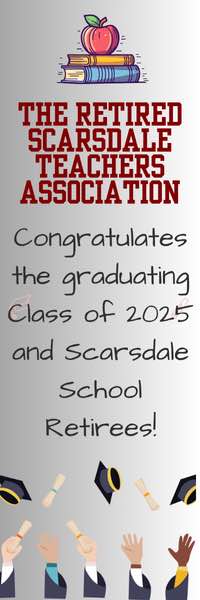 nurturing your interests and relationships outside of the classroom.
nurturing your interests and relationships outside of the classroom.
And so you have completed your coursework and your exams and your Senior Options and have earned a seat at this very ceremony.
This is not by accident but instead through commitment and dedication to your goals.
It is so good to see all of you here to celebrate this moment that is filled with meaning, as it represents both the accomplishment of having graduated and the commencement of your adult lives. Let us pause here for a moment to appreciate the beauty and significance of this moment.
As we celebrate this milestone with you this evening and in light of what you have accomplished, we also look to the future, not only for its possibilities and opportunities but also for its questions and unknowns. In that vein, I ask you to think with me in the next few minutes about quite a daunting challenge we all face, that of artificial intelligence. AI presents incredible opportunities and innumerable questions to us as individuals and as a society.
I offer for your consideration a parallel between artificial intelligence and nuclear energy. The potential of nuclear energy for good has been overshadowed by its potential for destruction on a massive scale, and its critics invoke historical examples of that destruction to nullify any positive impacts it might have for society in terms of energy production.
In a similar way, the critics of AI point to its environmental impact and theft of intellectual property, to say nothing of its inaccuracies, to draw our attention away from its potential benefits, such as analyzing medical test results to find indicators of disease or writing computer code that allows programmers to tackle more complicated tasks.
I am sure that many of your teachers have been urging you to resist using artificial intelligence so that you have the full benefit of learning the knowledge and skills we aim to teach you. But it is not only because of the learning opportunities you might miss.
Our desire to keep AI separate from your education is not only because of a specific assignment or task but also because when you delegate the tasks of reading and writing and even thinking to a machine or an algorithm, you miss the opportunity to develop the judgment and the emotional intelligence that are the additional benefits of academic inquiry and intellectual engagement.
College professors and high-school teachers are struggling with serious questions about how to proceed, how to design educational experiences and learning objectives and assessment tools in the age of AI. How do we get students to read deeply and write competently and reason clearly with the distraction and easy escape of technology? If AI can produce a decent or better quality literary response essay or even now a fully cited research paper, are those tasks still valid today as worthy of our time for you to write them and for us to grade them? If they are, how do we protect them from being invalidated by AI—and is that even possible? And if they aren’t worth our effort, then what is?
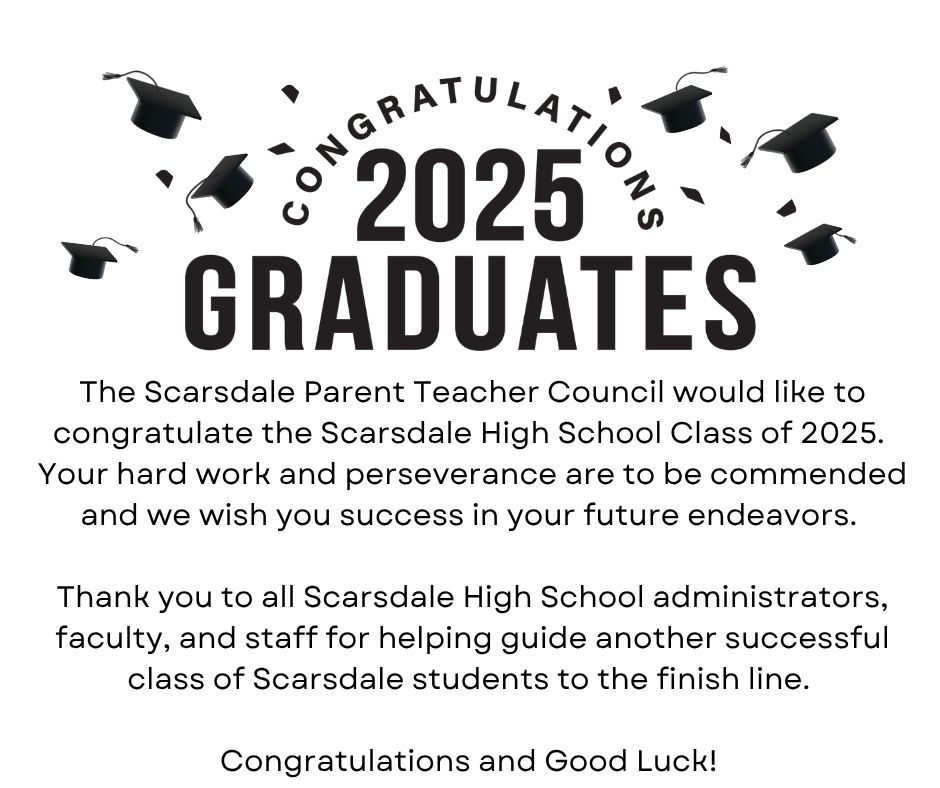 Intellectual engagement with history, for example, requires perspective-taking of an unfamiliar person from an unfamiliar time and place, and that experience of developing empathy and understanding enhances our ability to engage with others in our lives. Depriving people of education has been the hallmark of repression in the past, and I worry what might happen if we end up depriving ourselves of education because of the temptation this technology presents. Education bestows on us the gift of the ability to think which then gives us the freedom and the power to lead independent and productive lives.
Intellectual engagement with history, for example, requires perspective-taking of an unfamiliar person from an unfamiliar time and place, and that experience of developing empathy and understanding enhances our ability to engage with others in our lives. Depriving people of education has been the hallmark of repression in the past, and I worry what might happen if we end up depriving ourselves of education because of the temptation this technology presents. Education bestows on us the gift of the ability to think which then gives us the freedom and the power to lead independent and productive lives.
So the decision about this will be left to all of us, and you as the next generation, and just as with nuclear energy or plastics or automobiles or any other human product where both the costs and the benefits are significant and significantly at odds with each other, the answers are unlikely to be unequivocal, unchallenged, or final. This new product is with us, and we must make sense of it. The decision is ours—and will increasingly become yours to make.
And so we know that change is the only constant. How ironic that is, but it is also quite true. To make sense of all this—the world around you at the moment of your high-school graduation—I urge you to find a through line of humanity, and perhaps to begin by thinking of non sibi, of selfless service. Think about your educational journey here in Scarsdale. For some of you it started 13 years ago, or maybe 12, or maybe 7 years ago, or maybe in ninth grade, or maybe this past September.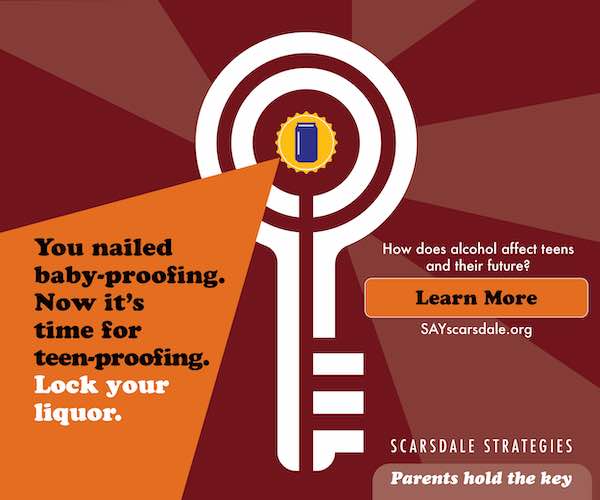
Think about that journey and think about the time that you or someone you know did a good deed, did something good or nice or thoughtful for you or for someone else. Think of how it made you feel to give someone the gift of your kindness, or to observe someone being kind, or even to be lucky enough to be the recipient of such a gift, and remember that this is what makes us human. Our need for empathy and respect and kindness is universal.
Finally, and in light of that humanity, I also urge you to build a legacy of love.
The key to your success in taking advantage of the many opportunities and meeting the many challenges that lie ahead will be to infuse love into your work, your relationships, and your self-regard.
Love is an active ingredient of our intelligence.
Knowledge is not acquired information like a computer stores data.
Rather, it involves an intentional engagement with whatever the information might be about.
Intelligence requires a dialogue with the world, and a state of flow is when we are fully immersed in the exchange.
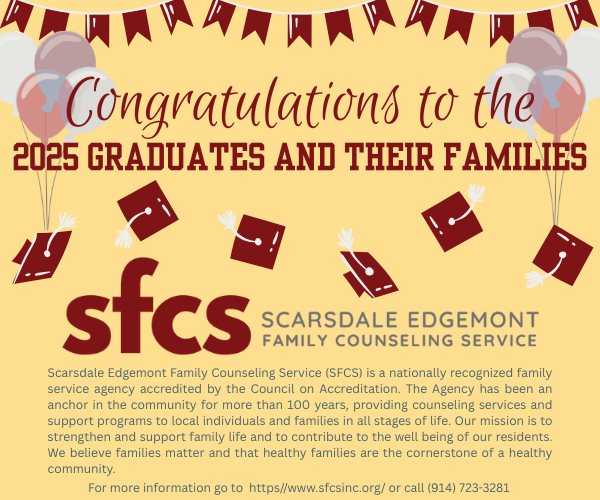 Love is what invites us into that connection.
Love is what invites us into that connection.
If you look around this field, you see your family and friends who demonstrated love in supporting you.
You see your teachers who loved teaching and guiding you.
And most importantly, you should look at yourselves and love what you see—an intelligent, curious, responsible person, poised to continue learning in order to take on the challenges of life and of our society.
I wish you all a wonderful graduation day and health and happiness in the future. Congratulations to you all!






